
The Generic Universal Role Playing System, or GURPS, is a tabletop role-playing game system published by Steve Jackson Games. The system is designed to run any genre using the same core mechanics. The core rules were first written by Steve Jackson and published in 1986, at a time when most such systems were story- or genre-specific. Since then, four editions have been published. The current line editor is Sean Punch.
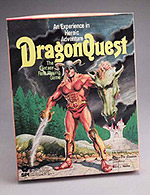
DragonQuest is a fantasy role-playing game originally published by Simulations Publications (SPI) in 1980. Where first generation fantasy role-playing games such as Dungeons & Dragons (D&D) restricted players to particular character classes, DragonQuest was one of the first games to utilize a system that emphasized skills, allowing more individual customization and a wider range of options.

The Whispering Vault is a horror-themed role-playing game originally published in 1993. Players take on the role of "Stalkers", persons who have risen above their own mortality to act as servants of the guardians of Reality, tracking down and apprehending rogue gods who have invaded Reality and returning them to the realm of the Unseen where they are cast into The Whispering Vault.

Wraith: The Oblivion is a tabletop role-playing game designed by Mark Rein·Hagen. It is set in the afterlife of White Wolf Publishing's classic World of Darkness setting, in which the players take on characters who are recently dead and are now ghosts.
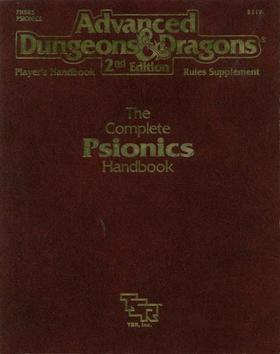
The Complete Psionics Handbook is a supplemental rulebook for the 2nd edition of the Dungeons & Dragons fantasy role-playing game, published in 1991 by TSR, Inc.

Unknown Armies is an occult-themed roleplaying game by John Scott Tynes and Greg Stolze, published by Atlas Games. The first edition was published in 1998, with the second and third editions being released in 2002 and 2017 respectively. The game is set in a postmodernist occult underground where characters wield magick by personal belief.

Robin D. Laws is a Canadian writer and game designer who lives in Toronto, Canada. He is the author of a number of novels and role-playing games as well as an anthologist.
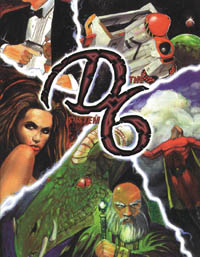
The D6 System is a role-playing game system published by West End Games (WEG) and licensees. While the system is primarily intended for pen-and-paper role-playing games, variations of the system have also been used in live action role-playing games and miniature battle games. The system is named after the six-sided die, which is used in every roll required by the system.
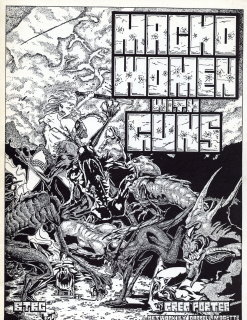
Macho Women with Guns (MWWG) is a comedy role-playing game originally created by Greg Porter and published by Blacksburg Tactical Research Center (BTRC). Nominally a science-fiction game, it parodies action films, how "strong female characters" are depicted in such films, and the tropes of popular violence-heavy role-playing games.
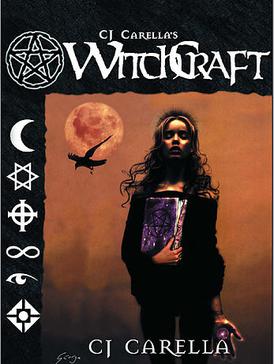
CJ Carella's WitchCraft, or more informally WitchCraft (ISBN 978-1891153402), is a modern horror role-playing game published by Eden Studios, Inc. It is based on the Unisystem game system and had been previously published by Myrmidon Press. In both cases it was designed and written by C. J. Carella. WitchCraft was the first RPG to use the Unisystem game system.

Aberrant is a role-playing game created by White Wolf Game Studio in 1999, set in 2008 in a world where super-powered humans started appearing one day in 1998. It is the middle setting in the greater Trinity Universe timeline, chronologically situated about 90 years after Adventure!, White Wolf's Pulp era game, and over a century before the psionic escapades of Trinity/Aeon. The game deals with how the players' meta-human characters fit into a mundane world when they most definitely are not mundane, as well as how the mundane populace react to the sudden emergence of novas. The original Aberrant product line was discontinued in 2002, though a d20 System version was released in 2004. Onyx Path Publishing has recently acquired the rights to the Trinity Universe and released a new edition of the game, titled Trinity Continuum: Aberrant, in 2021.

Bloodlust is a sword and sorcery fantasy role-playing game first released by French publisher Idéojeux in 1991 that allows players to take the role of both a powerful demonic weapon and the hero who wields the weapon.

Player's Option: Skills & Powers is a supplemental sourcebook to the core rules of the second edition of the Advanced Dungeons & Dragons fantasy role-playing game.

Dungeon Master Option: High-Level Campaigns is a supplemental sourcebook to the core rules of the 2nd edition Advanced Dungeons & Dragons (AD&D) fantasy role-playing game.

Player's Option: Spells & Magic is an accessory for the 2nd edition of the Advanced Dungeons & Dragons fantasy role-playing game, published in 1996.

Advanced Dungeons & Dragons CD-ROM Core Rules is computer program designed as an accessory for the Dungeons & Dragons fantasy role-playing game, originally published in 1996 and updated in 1999.

Dream Park: The Roleplaying Game is a role-playing game published by R. Talsorian Games in 1992. It was designed by Mike Pondsmith and was based on the 1981 novel Dream Park, which is itself about a live-action role-playing game amusement park. The player characters take on the roles of the players in this holographic game, simultaneously playing both the character and the character's alternate persona.
Jose Garcia is a game designer who has worked primarily on role-playing games.

Shadowrun is a science fantasy tabletop role-playing game set in an alternate future in which cybernetics, magic and fantasy creatures co-exist. It combines genres of cyberpunk, urban fantasy, and crime, with occasional elements of conspiracy, horror, and detective fiction. From its inception in 1989, it has spawned a franchise that includes a series of novels, a collectible card game, two miniature-based tabletop wargames, and multiple video games.

Aliens Adventure Game is a combat-oriented role-playing game published by Leading Edge Games in 1991.



















